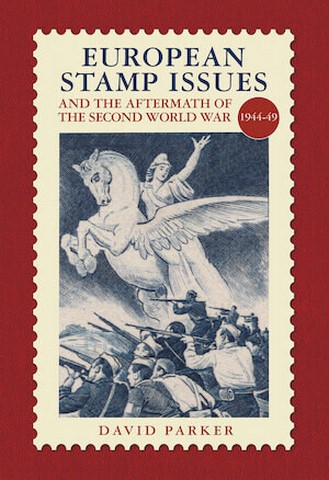250686 - EUROPEAN STAMP ISSUES And The Aftermath of the Second World War 1944-49

By David Parker
Stamps reflect contemporary ideas and events, and none more so than those at the end of the Second World War. They were seen by all governments as an invaluable means of publicity, promotion and persuasion. Skilfully designed and eye-catching, they reveal how the years 1944 to 1949 were decisive in reshaping Europe after Germany’s defeat. Not only did countries have to reconstruct shattered economies, rebuild devastated cities, and relieve widespread distress, but many underwent radical political realignments. Successive sets of stamps clearly depicted these events and, very significantly, the ideologies underpinning them.
In the aftermath of war complex domestic and international pressures strengthened the Zones of Occupation in Germany and, conversely, led to their swift abolition in Austria. Italy had been wracked by civil war, occupied by the Allies, and then exchanged its monarchy for a republic. Stamps vividly illuminate these stories, as they do events in Czechoslovakia, Hungary, Romania, Bulgaria, Albania and Yugoslavia which all evolved into Communist dictatorships – although their paths were far from identical. As in the USSR itself, all Communist regimes used their action-packed stamps to promote their collectivist policies and to celebrate past revolutionaries and recent wartime partisans. Communist success everywhere was avidly purveyed as the triumphant culmination of each nation’s struggles against tyranny. In the Balkans only Greece avoided becoming a Communist satellite, as Stalin kept his wartime agreement with Churchill and refused to support the Greek Communists. And like Greece, Finland’s stamps celebrated its independence, eye-catching landscape and traditions while always remembering its vulnerable position between East and West.
In the West stamps told other stories. In 1945 the Low Countries, Denmark and Norway returned to their ruling dynasties but with new left-wing governments striving to repair the damage to each nation’s pride, and international reputation as well as its infrastructure. Liberation was briefly celebrated, and then stamp issues concentrated upon reconstruction, and pride in the nation’s culture, sport and historic achievements. Even Great Britain, traditionally opposed to special issues, exerted itself to mark Peace in 1946 and the Olympic Games and the Universal Postal Union in 1948. In marked contrast France’s celebratory historical issues were particularly frequent as that country sought to exorcise its humiliating defeat and Vichy collaboration.
Stamps are the forgotten evidence. Carefully composed, and often revealingly biased, they offer significant insights into these tumultuous years.
| Format | Hardback |
| Pages | 248 |
| Publication Date |
Available! |
| Pictures |
over 250 images |
| Width (mm) | 220 |
| Height (mm) | 305 |
| Dust Jacket | Yes |
| ISBN | 978-0-85704-358-0 |
| Price |
£24.99 |

